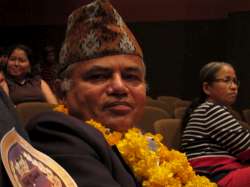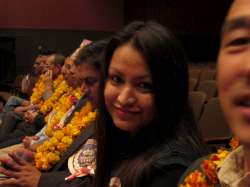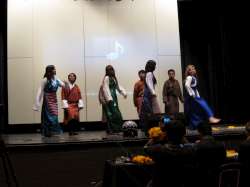|
|||||
 The
Bhutanese Community Association of Akron (BCAA) hosted a showing of the
movie Jhola on Sunday, September 28, 2014, in the Akron North
High School auditorium. Two parking lots were filled with cars. The
Bhutanese Community Association of Akron (BCAA) hosted a showing of the
movie Jhola on Sunday, September 28, 2014, in the Akron North
High School auditorium. Two parking lots were filled with cars. |
|||||
 It was a particularly noteworthy day because Krishna Dharabasi, author
of the book on which the movie was based, was in attendance. He
made some remarks to the audience and talked with those in
attendance. It was a particularly noteworthy day because Krishna Dharabasi, author
of the book on which the movie was based, was in attendance. He
made some remarks to the audience and talked with those in
attendance. |
|||||
| The program began with recognition of people who have been helpful to Bhutanese refugees in the Akron area. | |||||


 |
|||||
| The program continued with dances... | |||||


 |
|||||
| And speeches... | |||||


 |
|||||
|
Until the movie started. |
|||||
 Kanchi
Garima Panta (left) received high critical acclaim for her portrayal of
Kanchhi in Jhola. Kanchi
Garima Panta (left) received high critical acclaim for her portrayal of
Kanchhi in Jhola.The movie is about the historical Sati Nepali custom which requires the wife to throw herself on the burning pyre or be buried alive with her husband when he dies. It shows the cruel and inhuman practice faced by Hindu women. The author also calls attention to contemporary cases of sexual harassment, violence, and female trafficking -- all of which remain too common. |
|||||
|
Many people felt that the best lines in the movie were "Why is it that
only a woman has to sacrifice her life when a man dies; why can't he do
the same? ... and why is it acceptable for a man to marry for the second
time?" Jhola has been selected as the Nepal nomination of Best Foreign Language Film for the Oscar Awards given by the Academy of Motion Picture Arts and Sciences. |
|||||
| News | |||||
